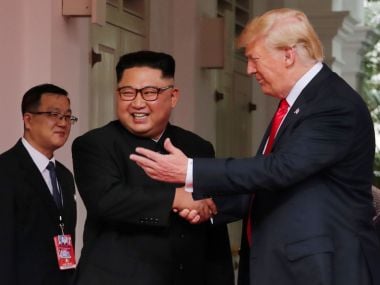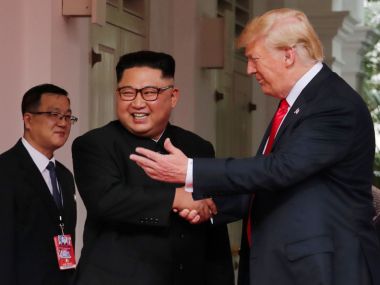Now that television channels and social media are spewing noise over the Donald Trump-Kim Jong-un denuclearisation meeting , it’s probably time to step back and take stock of some basic questions: What does the agreement seek to achieve? What is the likely impact on the region and thereby on India? [caption id=“attachment_4508983” align=“alignleft” width=“380”]  Donald Trump with Kim Jong-un on Tuesday. Reuters[/caption] First, the agreement is the very primary and a first step to getting the North Korean regime to roll back its nuclear weapons capability. It is not about human rights, or kidnapping, or any of the things the critics are demanding that Trump should have addressed. Yes, shaking hands with the US president legitimised Kim, a dictator. But this is the starting point for a series of negotiations, both at multilateral and bilateral levels on a step-by-step denuclearisation process of the Korean Peninsula. That’s going to mean a lot of meetings with an otherwise completely inaccessible and secretive regime. Down that road of engagement could lie the solution to the human rights issue. Yes, this is a despicable regime. But all the more reason to engage with it as early as possible, and get those nukes off the hands of such a dangerous leader. After all, the use of nuclear weapons is the ultimate human rights abuse. And so far, only one country in the world has used nuclear weapons. Second, though the agreement was between the US president and the North Korean dictator, the actual actors directly affected by the unstable regime are South Korea and Japan, and to a lesser extent Australia, a US ally. All these seemed to have been left in the lurch with the seeming commitment by Trump to end military exercises (and save money!) even though this is not written into the agreement. US allies have put up a brave face. Australian leaders have already discounted this as not being ‘official’, and rather sensibly presented this as a typically Trump proffer to get the agreement moving. The sentiment is that Trump is a businessman first and president second. He’ll take a call on those exercises when it suits him. South Korean president Moon Jae-in chose to ignore Trump’s unscripted remarks and expressed only delight and a promise to script a new history with North Korea. There is dismay at the apparent unilateral end of military exercises — which incidentally doesn’t mean a withdrawal of US troops — and also an implicit acknowledgement that trade is going to loom large in future negotiations with the US. But the preferences of the leadership aside, there is a very real and earnest desire among the people to mend fences with North Korea. Unlike western writers — who are several thousand kilometres away from a possible nuclear war site — it is noticeable that South Korean commentators have tended to compare the summit to the Malta Summit of 1989, where Mikhail Gorbachev and George W Bush formally ended the Cold War. Major Korean language daily JoonAng Ilbo said “the summit of the century” may possibly “pave the way to a formal end to the 1950-53 Korean War”. Everyone acknowledges that this is not going to be easy, with Pyongyang negotiating every step of the way. But there’s no mistaking the acknowledgement that the region may be on the brink of historic change. Japan is less enamoured with the whole summit, particularly since the ebullient Chairman Kim has been quoted as saying that President Trump agreed to not just stop military exercises but also to lift sanctions. The Japanese defence minister Itsunori Onodera made it clear that the country has been closely coordinating with the US and South Korea in the run-up to the summit. Japan is, perhaps more so than South Korea, the target of North Korean missiles, with several missile tests going towards or over Japanese territory. In September, for instance, residents were awoken with alarms and alerts as Pyongyang fired a missile into the Pacific. These and other incidents have had Japan slowly retreating from its “self-defence” stand, and calls within Japan to acquire nuclear weapons have been rising. Sections of the Japanese press have been deeply critical of the fact that the goal of CVID (complete verifiable, and irreversible disarmament), repeatedly stressed by Trump himself, was completely missed out in the text of the agreement because “there was no time.” The lack of a specific time line has also been condemned roundly. The scepticism is hardly surprising, given that North Korean regimes are not known for keeping to any promises, written or otherwise. But Japan will play along, and will also pay along for Democratic People’s Republic of Korea (DPRK) expenses as the process of negotiation unfolds. No freebies can be expected from Trump, as he said. The final and most crucial issue is that of China: Part-time friend, trading partner and massive neighbour to North Korea. The US secretary of state Mike Pompeo is to visit Beijing to brief the Chinese foreign minister Wang Yi. That China was partnering the summit was clear from the fact that Kim probably would not have got off the ground without Beijing’s assent. Flying through Chinese airspace, in a Chinese aircraft, it would almost seem that Kim had been brought there under guard. However, the central question that arises is what Beijing has to say on the “security guarantees” that the US is to offer DPRK. Clearly, it can’t be a guarantee against Chinese attack or invasion (like Russia into Crimea) which would hardly see Chinese cooperation. Alternatively, the median position could probably be acceptable, which is that the US will never enter North Korea or position troops there. There’s even a likelihood that China will offer its own security guarantees. In which case, the whole situation acquires the character of a Rubik’s Cube. On the whole, the summit brought out Trump’s negotiation style: Brusque, erratic and sometimes downright surreal. He got his opponent to the table after a period of ‘fire and fury’, screened a strange video production that appeared to sell the idea of a North Korean paradise with US help (read investment not aid) and went off the text by offering an end to military exercises. In terms of end effect, this was a marketing exercise on the one hand where DPRK was concerned, and a sly strategy on the other. The holding of military exercises or US troops presence has been turned into a negotiation tactic to get the South Koreans and Japanese in line on a number of issues, including paying for peace on the peninsula. This is pure leverage and a good one since it costs nothing. The end of North Korean nuclear capability will lead to a sigh of relief in India, where analysts had long warned of a Pakistan-China-North Korean triangular cooperation. But as the programme winds down, the dangers of proliferation will temporarily increase as Pyongyang will either willingly or otherwise, sell its expertise to the highest bidders. That includes North Korean scientists and their core knowledge which will suddenly become redundant. Arms control experts are well aware of the dangers, and a close eye will need to be kept on any movement. In the larger sphere of diplomacy, however, Indian leadership needs to take a page from Trump’s negotiating style, drop the diplomatic language and go for the kill. A one-pager will do, as long as it does the job: Backed up by a bevy of businessmen rather than the earnest young men in suits and their bulging files.
Now that television channels and social media is spewing noise over the Donald Trump-Kim Jong-un denuclearisation meeting, its probably time to step back and take stock of some basic questions: What does the agreement seek to achieve? What is the likely impact on the region and thereby on India?
Advertisement
End of Article


)

)
)
)
)
)
)
)
)



